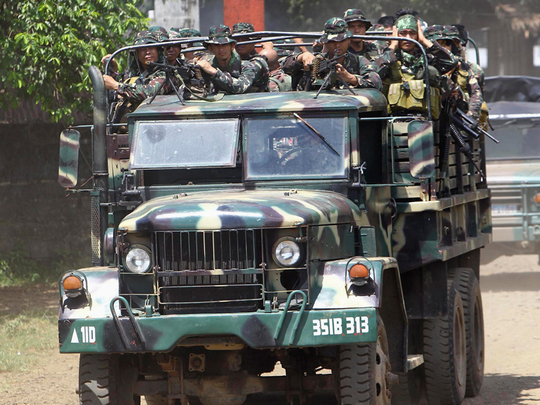
Manila: A military rescue operation, including negotiations, have intensified to save two German hostages nationals from an Al Qaida-linked militant Filipino-Muslim group that threatened to behead one hostage if its 250 million pesos ($2.6 million, Dh20.83 million) ransom demand is not delivered on time, sources told Gulf News.
Around 2,000 soldiers have entered identified forested lairs of the Abu Sayyaf Group in Patikul town, Sulu as soon as they arrived in Sulu on Thursday. “Members of the Task Force Zambasulta were ordered to take Stefan Okonek, in his 70s, and Henrike Diesen, 55, alive from the hands of the Abu Sayyaf Group,” said Rear Admiral Reynaldo Yoma.
Warrants of arrest would be served to the hostage-takers, including Abu Sayyaf Commander Hatib Hajan Sawadjaan and his followers who are holding Okonek and Diesen in Patikul town in Sulu, a staff member of Patikul Mayor Kabir Hayudini who requested anonymity told Gulf News.
“We are doing everything to save the two hostages,” said the same source.
Meanwhile, negotiations with the kidnappers led by local government leaders, the family of the hostages, and the German government have continued even if self-proclaimed Abu Sayyaf spokesman Abu Rami announced in a Facebook account on Thursday that Okonek would be beheaded if demands are not met at 3 pm, October 17, said the same source.
Negotiators wanted to pay an amount lower than 250 million pesos (Dh20.83 million) ransom that was demanded by the Abu Sayyaf Group, said the same source, adding that German and Philippine authorities, in several instances, have hinted that “the negotiations have begun have not yet ended”.
Armed Forces of the Philippines Vice-Chief of Staff Lieutenant General John Bonafos also said, ”They [the abductors] are doing that [threats on Facebook] to pressure us to meet their demands.”
Sawsan Chebli, spokeswoman of Germany’s foreign ministry hinted of back-door talks two weeks earlier, after German and Philippine authorities confirmed the abduction of the two German nationals at gunpoint, as they sailed in a yacht between Palawan, southwestern Philippines, near Sabah last April.
At the time, Chebli said, “We have an emergency task force that will extensively deal with how a release of the hostages can be achieved. But I cannot disclose details at this point.”
This was after the Abu Sayyaf Group released online showed images of masked men who surrounded the two German hostages, and pictures of a machete that hovered above Okonek’s head.
Germany has initially responded to one of the demands of the Abu Sayyaf Group. It has not joined air strikes on areas occupied by Daesh.
But Germany has agreed instead to send weapons and 40 paratroopers to train Kurdish fighters as the US, other allied countries, including several Arab states led a military campaign in Syria’s war zones.
It is not known if the Abu Sayyaf Group will be satisfied if Germany vows to stop sending weapons and soldiers to train Kurdish fighters in Syria, a political analyst told Gulf News.
Earlier, in a video uploaded online, the Abu Sayyaf Group and the Bangasmoro Islamic Freedom Movement (BIFM), a renegade group of the Moro Islamic Liberation front (MILF) that forged a pro-autonomy peace settlement with the Philippine government last March, expressed support for Daesh.
The Abu Sayyaf Group has become emboldened to ask for higher ransom demand for the release of hostages because local and foreign media have given prominence to Daesh, said Lieutenant General Rustico Guerrero who is in charge of the western command in southern Philippines.
The Abu Sayyaf Group has been blamed for high-profile kidnappings for ransom, beheadings, bombings, and other terror activities in the south, and in the sea lanes between the borders of Malaysia and the Philippines.
It claimed responsibility for a bomb attack on a passenger ferry that killed 116 people on Manila Bay in 2004.
In 2002, the Philippine government allowed US soldiers to extend for six months intelligence assistance to Filipino soldiers who were tasked to track down Abu Sayyaf members in the south.
The group is now divided into different factions, and its main leader has remained unknown, making it harder for government authorities to deal with one terror leader.It has links with Jemaah Islamiyah, the Southeast Asian conduit of Al Qaida.












